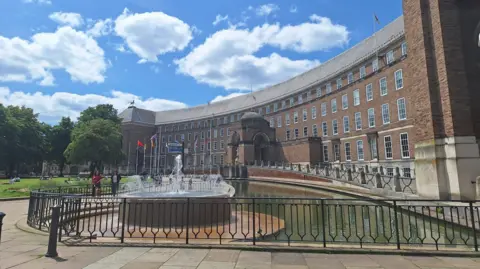Leigh Boobyer
BBC News, West of England
 Gloucestershire Airport Ltd
Gloucestershire Airport Ltd
Gloucester City and Cheltenham Borough councils sold Gloucestershire Airport to partly help pay off their debts
An airport, shops and offices are being sold across the West by councils whose debts have increased by a total of about £245m in the last year alone.
A BBC study of local government finances has found that some councils, including Swindon Borough Council and Cheltenham Borough Council, took on more debt last year – with Bristol City Council clocking up the biggest rise in the West of £105m.
Last month, Gloucestershire Airport, which is jointly owned by Cheltenham Borough Council and Gloucester City Council, was sold for £25m. Part of the proceeds were to be used to pay off debts.
The government said it planned to “reform the funding system”, which it said was “broken”.
Nationally, struggling councils face debt of £122bn – and hundreds of buildings including schools and care homes are being sold.
The BBC analysis found debt rose for the following councils in the West in 2024/25 compared with the year before:
- Bristol City Council – £105m increase to £600m
- Bath and North East Somerset Council – £29.7m increase to £276m
- Gloucester City Council – £42.2m increase to £243m
- Swindon Borough Council – £23.9m increase to £395m
- Cheltenham Borough Council – £3m increase to £204m
- Wiltshire Council – £37.3m increase to £420m
- South Gloucestershire Council – £3.55m increase to £151.55m.
However, North Somerset Council, Gloucestershire County Council, Tewkesbury Borough Council and Somerset Council all reduced their debt.
Stroud District Council was the only authority with figures that stayed the same.
It is not known if Bristol City Council, which needs to plug a £63m hole in its schools budget, will sell off any of its assets.
But the Local Democracy Reporting Service reported in January the council was considering selling more than 1,200 council homes to raise money for housing services.
Bristol City Council and South Gloucestershire Council have been approached for comment.

Bristol City Council saw its debt increase by £105m in the last financial year
Gloucester City Council’s cabinet member for finance, councillor Declan Wilson, said its debt has risen because of investment into the city’s King’s Quarter which includes the £107m Forum project.
Gloucester City Council leader Jeremy Hilton said in a council meeting in March that the sale of Gloucestershire Airport would be used to wipe debt relating to borrowing for a £7.5m refurbishment of the site in 2021.
The remaining money from the sale was to be shared equally between the two owning councils.
Cheltenham Borough Council said £2.3m of its £3m debt increase last year related to affordable housing costs, with the remainder spent on its services.
It added it repaid £2.6m in debt between 2023/24 and 2024/25.
Somerset Council is one of 30 councils in the country that has received powers from the government to sell off assets in order to fund day-to-day services.
It is now selling shops and offices in its commercial property portfolio.
Somerset Council has been approached for comment.
Swindon Borough Council, meanwhile, is selling two industrial estates for £16m to pay off some of its debt.
‘Saving taxpayers money’
Councillor Kevin Small said the authority would only borrow money as a last resort after exhausting other cash resources.
“In the financial year in question, the council actually invested £75m in infrastructure, housing and facilities to benefit local residents,” he said, explaining the money borrowed went towards things such as recycling lorries, the town’s new museum and art gallery and on new systems to help protect vulnerable children and adults
Mr Small, Swindon Borough Council’s cabinet member for finance, added: “Alongside this, the Council’s finance officers also prudently manage our finances advising on when and how best to sell assets that are surplus to requirements, which then can be used to pay off outstanding debt and interest charges, or allocated to a new capital project.
“This means we then do not have to borrow additional money, which saves Swindon taxpayers money.”
‘Paper over cracks’
Jonathan Carr-West, of the Local Government Information Unit think-tank, said the spiralling levels of debt at local authorities was “extremely worrying”.
He said: “That is not a sustainable system. As one local government finance officer said to me, it’s essentially payday loans for local governments.
“I don’t think the government would say that’s it’s long-term ambition. They would say that is what we have had to do to paper over the cracks while we introduce a new funding system for local government.”
A spokesman from the Ministry of Housing, Communities and Local Government said: “While councils are responsible for managing their own budgets, we know that the current funding system is broken which is why we are taking decisive action so local leaders can deliver the public services their communities rely on.”
The spokesman added that councils would receive a £3.4bn boost in funding for local services.

